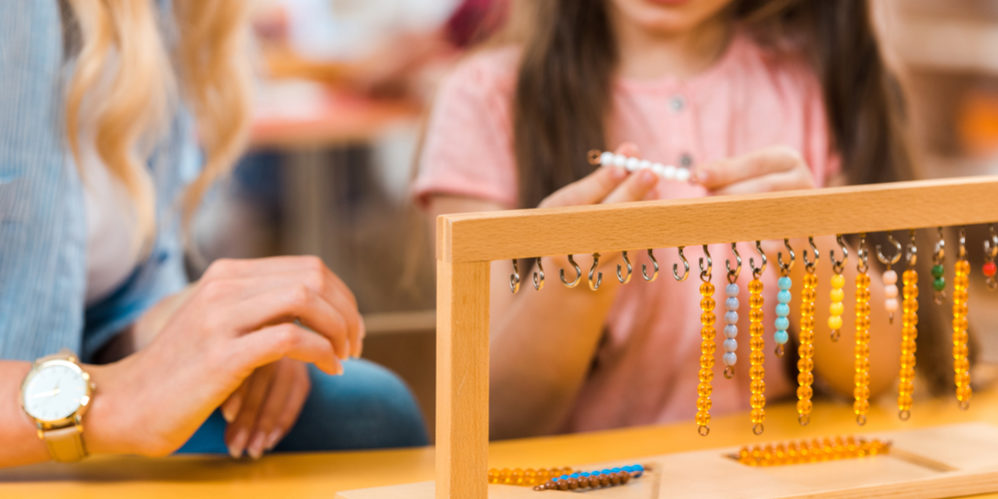Did you know that the Montessori educational method has been around for over 100 years now? The method designed by Dr. Maria Montessori has seen a boom of popularity recently, and more schools are opening up under the Montessori name. Yet, research on the effectiveness of Montessori pedagogy has lacked up until recent years. Now that Montessori is becoming more popular, scientists have begun paying attention to the outcomes.
We have gathered up the key points of those studies to share them with you here, so you can better understand how a Montessori education compares with classic programs.
Scientific Evaluations of the Montessori Method
One notable study of the Montessori method was conducted by Lillard and Else-Quest in 2006 for Science. The study selected students for various schools between the ages 5-12 at random, putting them in either the Montessori group or non-Montessori group. The results showed that Montessori was effective.
For instance, the 5-year old Montessori group had significant differences in skill level when compared to those who didn’t receive a Montessori education. The 5-year olds had better letter-word identification, math skills, and phonological decoding abilities; their executive function and social skills were also far more developed.
The conclusive statement from the Lillard and Else-Quest study was that “at least when strictly implemented, Montessori education fosters social and academic skills that are equal or superior to those fostered by a pool of other types of schools.”
However, the study used only a single high-fidelity school and received criticism for such a small sample group. This marks one of the struggles with qualifying whether Montessori methodologies work or not. Montessori did not copyright her pedagogical works, and there is a presence of Montessori schools that are not purely Montessori.
In this case, what happens to those students from low-fidelity Montessori schools? Do they receive the same benefit as seen in the 2006 study?
A More In-Depth Study
In a npj Science of Learning 2017 study, Montessori education was called a “complex package,” due to the elements that have been incorporated into the methodology. How can you figure out which elements do and don’t work when everything works together in harmony? Therefore, the researchers decided to look at two core components: the learning materials that fill the classrooms and the effect of self-directed engagement with said materials.
But they also considered previous studies and compared the results to their own findings. They noted limitations within the structures of classrooms, the variances between high- and low-fidelity schools, levels of executive function within the students, the differences in genders, curriculum, and quality of the teachers.
Results and Conclusions from the Research
When the research results had been gathered, a couple of conclusions were made. First, the segmented method that Montessori classrooms use to teach various academic skills, such as writing, does indeed work. What does that mean? Take writing, for example. Montessori designed the lessons to break writing down into component skills, such as pencil control (handwriting), vocabulary, grammar, spelling, and syntax. In a Montessori school, each skill is developed independently before being practiced together, and at any time, the student can choose to return back to focusing on a single skill.
With teaching mathematics, the results also concluded Montessori to be beneficial. Why? Sensorial activities like the constructive triangles or fraction circles help students with conceptual knowledge, as do practical life skills. For example, a child might use fractions to understand how to cut a fruit so it serves 3 people instead of 2.
It should be noted that other studies have revealed similar conclusions. For example, a study published in 2017 by Frontiers Media found that children in Montessori programs “excelled in academic achievement” because the materials “capitalize on the embodiment of cognition, for example having children trace letters as they say the letter sounds.” This is much more engaging than having to sit still and listen, which in turn, helps the students retain what they are learning.
Additionally, it was found that students in Montessori classrooms have better theory of mind. In the same way research has found that children with older siblings have more developed theory of mind, so too does the multi-age classroom. It is believed that this is the result of there being one set of every Montessori material, leading to certain challenges that help children confront and overcome challenges.
The Quality of the School and Teacher Matter
Ultimately, the deciding factor of whether the Montessori method was conducive to learning or not was based on quality. As mentioned earlier, students in a low-fidelity school that didn’t utilize Montessori’s core tenets completely didn’t fare as well as those who came from high-fidelity schools.
Secondly, the teachers themselves could have a direct effect on the educational outcome. Although the Montessori classroom is largely self-guided, letting the children be as independent as possible, the way the teacher conducts themselves and interacts with the students does influence the quality of education. Sometimes, the expectations a teacher has, along with the programs they design, might change the ways a child receives their education.
As a parent who is interested in enrolling your child in a Montessori program, it is critical that you look for a certified school with highly educated teachers. This ensures that the classroom will be faithful to the Montessori methodologies that work.
Looking for a Montessori School?
Overall, the evidence regarding the Montessori method is largely positive. Although there have been limitations with gathering quality data, the studies that took this into account did conclude that components of Montessori are beneficial to a child’s development. The academic, social, and emotional advantages of a Montessori classroom outweigh more traditional settings.
Fishtown Montessori is a superior Montessori school in Philadelphia. Our programs were designed by exceptional and experienced teachers. We know your child is going to love it here. See what makes us different. Give us a call and schedule your tour today!






